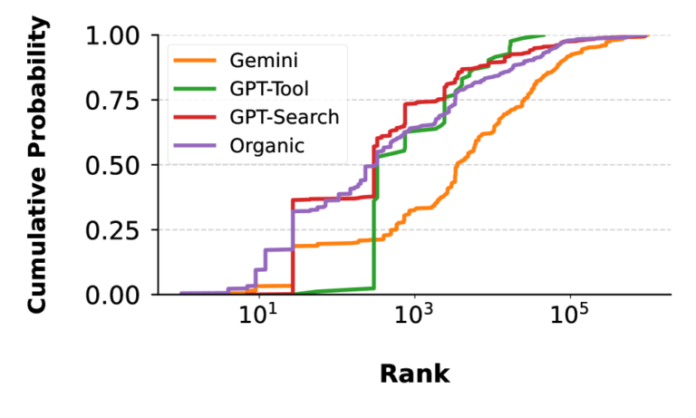New research from Ruhr University Bochum and the Max Planck Institute for Software Systems shows that AI-powered search engines select information from very different parts of the Internet compared to traditional search results.
The pre-print study, titled “Characterizing Web Search in The Age of Generative AI,” examined Google’s standard search links alongside results from Google AI Overviews, Gemini-2.5-Flash, GPT-4o Web Search, and GPT-4o with Search Tool.
The analysts drew on user queries from multiple datasets, including political topics from AllSides and search data for popular products.
The researchers found that generative search systems often rely on less common sources. They report that 53 percent of websites cited in Google AI Overviews do not appear in Google’s top 10 organic results for the same query, and 40 percent do not show up in the first 100 links.
Gemini-2.5-Flash showed the strongest pattern, frequently citing domains outside the top 1,000 websites tracked by the Tranco popularity index.
“AI systems search deeper into the web than traditional search rankings,” the authors write. They describe this as a shift toward a wider pool of information, though they note that reliability can vary among low-visibility sites.
The study also observes that AI search tools compress information. The number of distinct “concepts” included in answers was similar to what appears across the top ten traditional results. However, the researchers state that generative systems “sometimes omit secondary or ambiguous aspects,” especially when a name or term refers to multiple subjects.
Another limitation appears in fast-moving topics. When given queries from Google’s Trending Searches list for September 15, GPT-4o with Search Tool often responded by asking users to provide more details, instead of retrieving current web pages. The authors say this reflects heavy dependence on pre-trained knowledge for recent events.
The team does not argue that either approach is superior. Instead, they propose new ways to evaluate search quality that include source diversity, coverage of ideas, and accuracy of synthesis.
Google Introduces AI-Based Query Grouping
In a separate announcement, Google introduced a Search Console Insights feature called Query groups. The company says the system uses AI to cluster similar searches so website owners can identify broader interests behind different phrases. The interface displays:
-
Total clicks per group
-
A list of queries ordered by performance
-
Indicators showing groups trending up or down
Google reports that Query groups will appear gradually over the next few weeks for properties with large volumes of search queries. The company states that the feature does not influence ranking and may change as new data is processed.



